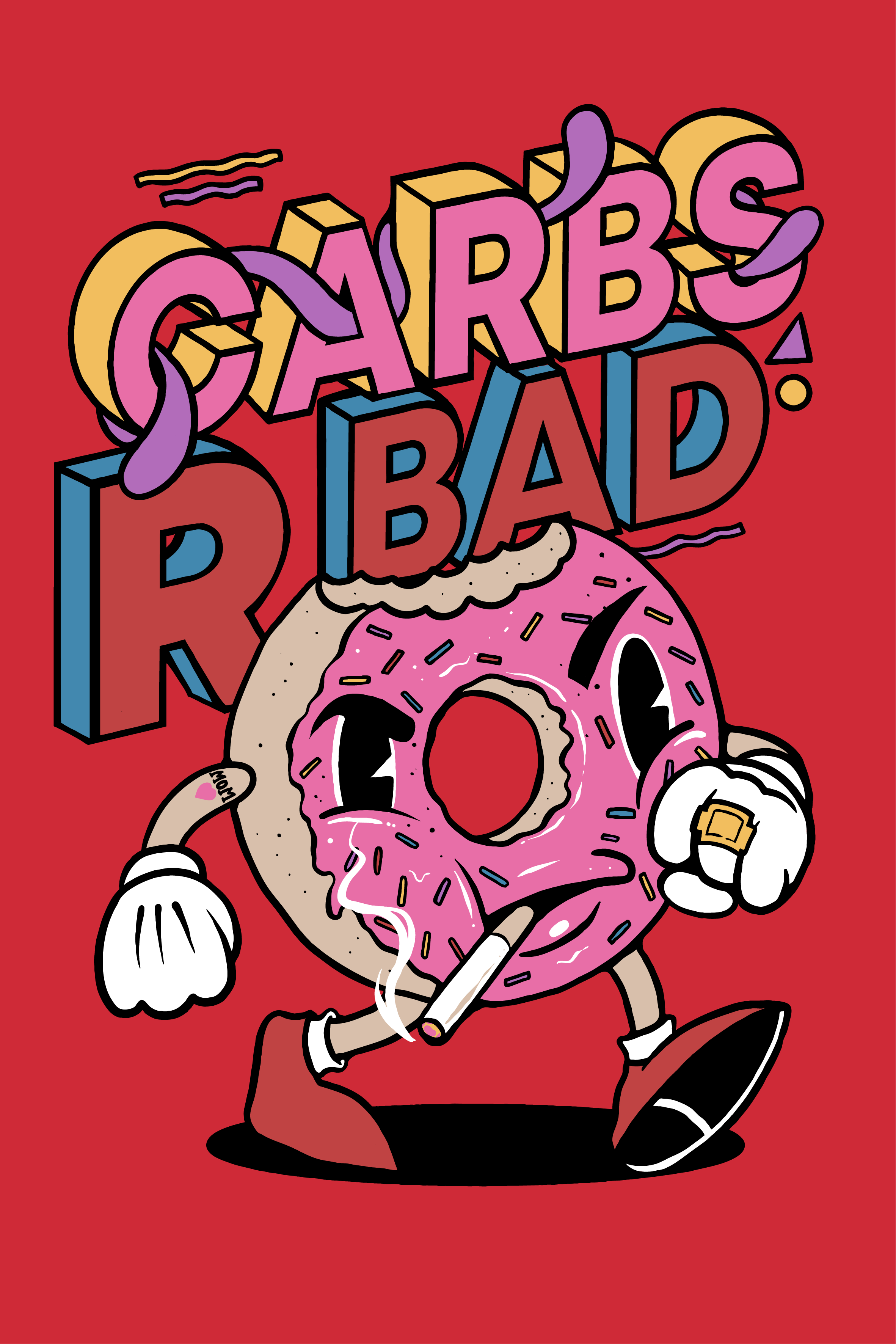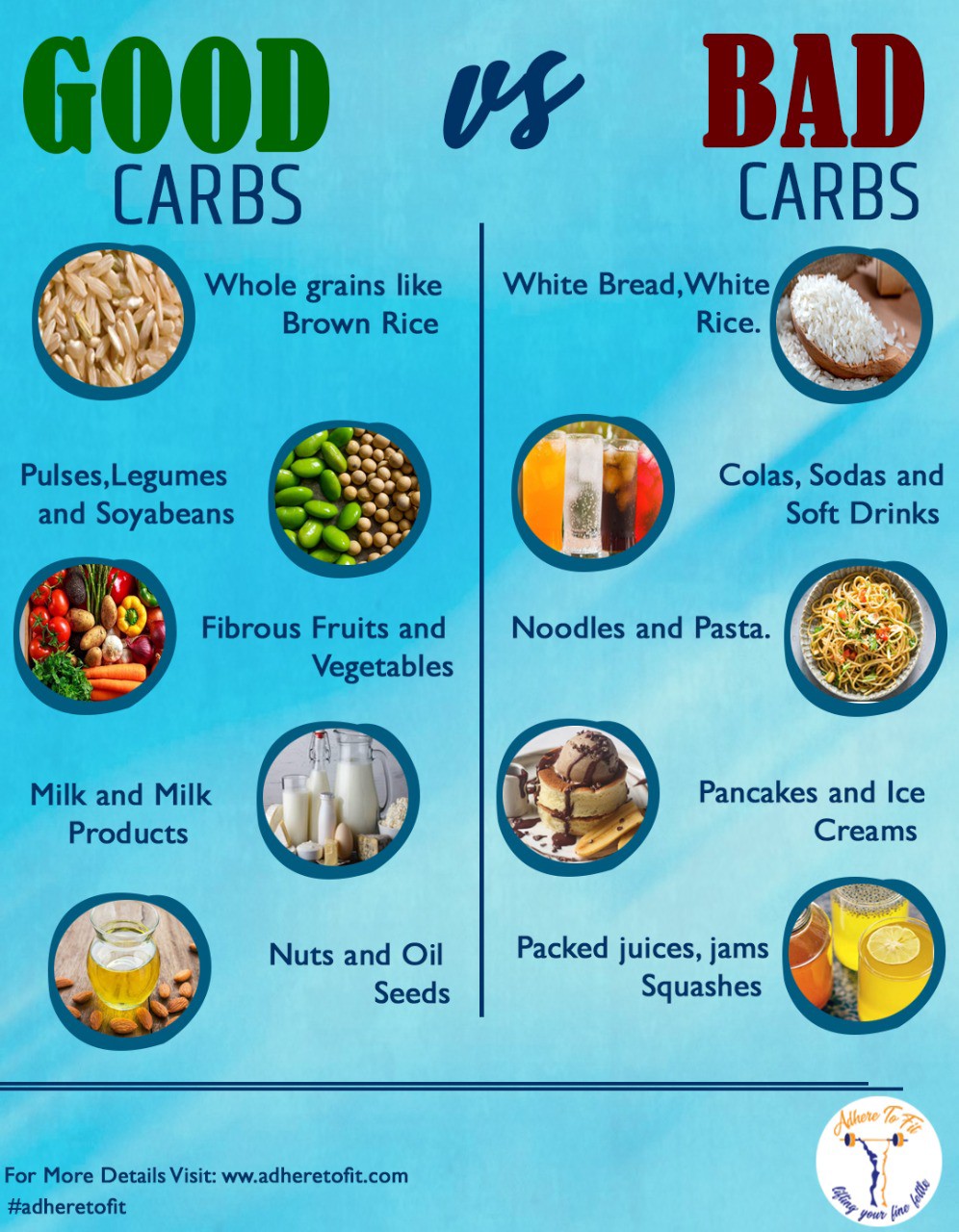Are Carbs Really that Bad?
 Background
Background
Carbohydrates, the base to almost every food pyramid we grew up seeing has gotten a bad reputation when it comes to balanced nutrition. Foods such as macaroni, mashed potatoes, chips, cake, etc. are all loaded with carbs. That’s right your favorite comfort food is the boy of the diet world. Media outlets today are pushing a low carb diet culture and promoting diets such as Keto or Atkins that are built on a low to no carb guideline. Are these diets really the way to go or are carbs just really misunderstood?
A balanced diet is essential for a healthy lifestyle and cutting out a whole food group is never really recommended. There are important vitamins and minerals that come from some starchy foods, but not all carbohydrates are created equal. Some media reports will try to sell you on fad diets to help lose weight or claim to promote a healthier lifestyle, but cutting carbs may not be sustainable long term or healthy if you are not replacing those essential vitamins and minerals.
Media Reports
In an article, provided by the Today show, they explore low carb diets and what you should know before trying one. Apparently cutting carbs has been around for over 150 years when it comes to dieting. The article also mentions diet programs Atkins, Keto, and Paleo and how they each promote various carb limitations for weight loss. Refined carbs do not offer a lot of nutritional value and should be limited, but other carbs have a lot of nutritional value that ends up being cut out when following these low carb diets. Recommended dietary guidelines for adults do not limit carbs and instead say you should be consuming 200-300g a day. The issue is the type of carbs you are eating. For example, a piece of toast or fruit and a few packets of sugar may have the same amount of carbs, but completely different nutritional values. The article as whole supports a low carb diet for maintaining weight loss and even provides a video with their host Al Roker, cooking a low carb meal. (Thurrcott, 2020) Research actually finds that low carb diets are not sustainable long term and may cause an increase in weight gain.
https://www.today.com/health/low-carb-diet-what-you-should-know-trying-one-today-t197225
 Another media publication, Grist, also has an article supporting weight loss diets, they even quote the L.A. Times that states that there is scientific evidence that says carbs, not fat, are responsible for obesity, diabetes, and heart disease. They have chosen to pair the article with a chubby Santa eating a cookie just in time to remind people that holiday food is chock full of carbs. Once again there is support for the low carb diet, Atkins and a quote from the chairman of nutrition at the Harvard School for Public Health –
Another media publication, Grist, also has an article supporting weight loss diets, they even quote the L.A. Times that states that there is scientific evidence that says carbs, not fat, are responsible for obesity, diabetes, and heart disease. They have chosen to pair the article with a chubby Santa eating a cookie just in time to remind people that holiday food is chock full of carbs. Once again there is support for the low carb diet, Atkins and a quote from the chairman of nutrition at the Harvard School for Public Health –
“If Americans could eliminate sugary beverages, potatoes, white bread, pasta, white rice and sugary snacks, we would wipe out almost all the problems we have with weight and diabetes and other metabolic diseases.” (Bruske, 2021)
Clearly a gross oversimplification of the obesity pandemic plaguing our country. The overall message that we should eat more fats is also shared by the video below from CBS news that is riddled with factoids and catchphrases about how bad carbs are and how they actually lower life expectancy. The problem with all these media sources is the lack of distinction between what kind of fats and carbs are being consumed. However they did not note what specific foods nutritionist were derived from. (CBS, 2017) There are different nutritional values to each food group, but if we only eat the processed refined stuff clearly there is no nutritional value in that.
https://grist.org/article/food-2010-12-20-scientists-say-carbs-not-fat-are-the-biggest-problem-with/
The Truth
Scientific Reports
Yes, carbohydrates can be bad, but not all are bad. There are whole wheat grains and complex carbohydrates that have numerous nutritional benefits that are recommended for a balanced diet. Today’s dietician is a peer-reviewed, evidence based resource that provides scientific facts about nutrition. In their article on low- carb diets they explain how they can be extremely beneficial to those battling diabetes, but realistically low carb diets are not sustainable in the longterm.  Although, they stipulate that a low carb diet could be a good way to kick start weight loss, similarly to the media articles discussed above, there must be a plan of transition so as not to end up binge eating and gaining more weight. (Brown-Riggs, 2016) The Journal of Nutrition, Health, and Aging, another trusted source, provides a concise review on the merits and pitfalls of a low carb diet. Again, the main benefits are listed as short term weight loss and glycemic control, but they also point out major negatives. These include electrolyte loss, fatigue, and even mortality. The real message from this article is that the quality of the food you eat is more important than the quantity when it comes to healthy dieting. (Mooradian, 2020) Another scientific publication, Nutrition and Metabolism, provides some supporting data points for how carbohydrates can actually be beneficial. Out of 7000 participants they found a correlation between an increased carbohydrate diet and a lower risk of anxiety and depression. (Sangsefidi et al., 2021) So, not only can carbs provide important vitamins and minerals for your physical health, but can also be beneficial to your mental health.
Although, they stipulate that a low carb diet could be a good way to kick start weight loss, similarly to the media articles discussed above, there must be a plan of transition so as not to end up binge eating and gaining more weight. (Brown-Riggs, 2016) The Journal of Nutrition, Health, and Aging, another trusted source, provides a concise review on the merits and pitfalls of a low carb diet. Again, the main benefits are listed as short term weight loss and glycemic control, but they also point out major negatives. These include electrolyte loss, fatigue, and even mortality. The real message from this article is that the quality of the food you eat is more important than the quantity when it comes to healthy dieting. (Mooradian, 2020) Another scientific publication, Nutrition and Metabolism, provides some supporting data points for how carbohydrates can actually be beneficial. Out of 7000 participants they found a correlation between an increased carbohydrate diet and a lower risk of anxiety and depression. (Sangsefidi et al., 2021) So, not only can carbs provide important vitamins and minerals for your physical health, but can also be beneficial to your mental health.
The takeaway
So, the media reports did not get everything wrong. There are benefits to low carb diets, such as kick starting weight loss and glycemic control for those diagnosed with diabetes. Some carbs really are bad, and need to be consumed in moderation, but cutting out carbs completely really is not recommended from a nutritional stand point. The focus should be on the quality of food you are consuming. Even if you choose to follow Keto or Atkins who encouraged high fat diets, the type of fat you eat matters as well. You should eat good fats like avocados and olive oil not bacon and cheese. Same logic goes for carbohydrates, choose oatmeal and multigrain toast over white rice and white bread. When doing your own research make sure media publications are using information from leading experts in the field of nutrition. Remember when in doubt practice moderation because sometimes it is ok to indulge in a cookie.
References
Brown-Riggs, C. (2016) Low-carb diets and diabetes. Today’s Dietician, 18(8), 24-27
Bruske, E. (2021, April 7). Scientists say carbs — not fat — are the biggest problem with America’s diet. Grist.org. Retrieved November 19, 2021, from https://grist.org/article/food-2010-12-20-scientists-say-carbs-not-fat-are-the-biggest-problem-with/.
CBS News. (2017, August 30) New Study suggests its carbs, not fats, that are bad for your health. [Video] Youtube. https://www.youtube.com/watch?v=yhRb89_dIAg.
Mooradian, Arshag D. (2020) The Merits and the Pitfalls of Low Carbohydrate Diet: A Concise Review. Journal of Nutrition, Health, and Aging, 24(7), 805-808.
Sangsefidi, Z., Salehi-Abarghouei, A., Sangsefidi, Z., Mirzaei, M., & Hosseinzadeh, M. (2021) The relation between low carbohydrate diet score and psychological disorders among Iranian adults. Nutrition and Metabolism, 18(1), 1-9.
Thurrott, S. T. (2020, November 5). Low-carb diets: Why they’re so popular and what to know before trying one. TODAY.com. Retrieved November 19, 2021, from https://www.today.com/health/low-carb-diet-what-you-should-know-trying-one-today-t197225.


I really enjoyed this blog. My family has been doing Keto for about a year now and at first we were all dieting wrong due to information from the media. The blog post is organized and easy to read, the visuals provided were helpful to clarify information. I have noticed it is a trend for the media to have some accurate information and some information that is fiction.
Hi there!
I think this is an awesome blog. I have read a lot about diets throughout my life and have had many unsuccessful attempts at maintaining a diet. I’ve seen things like 9 day fat burning soup diets, where all you eat is this one soup for nine days to loose something like 10 pounds. I feel that there is a lot more “fake” news out there about diets and the dangers of carbs than there is informational and correct news, like this post. Also, most information I see online about diets isn’t usually backed by evidence, or that evidence isn’t mentioned in the article. I think this is the perfect blend of information and you wrote in a way that would connect to the reader and it was very easy to understand in relation to your chosen terms and language used.
Great post! I loved your use visuals and simple wording throughout the post, yet captured readers with evidence based research. I have done a variety of my own research on this topic and the use of ‘no carb’ diets and I agree with your statement of it all comes down to a healthy lifestyle and moderation. Following a no carb or low carb diet will not work for it’s intended purpose if you do not eat the correct foods such as eating cheese and bacon versus fruits and vegetables. The media may only portray the best story of such topic and not necessarily the entire truth, so it is our job as readers to do our own research on the topic and find what works best for us!